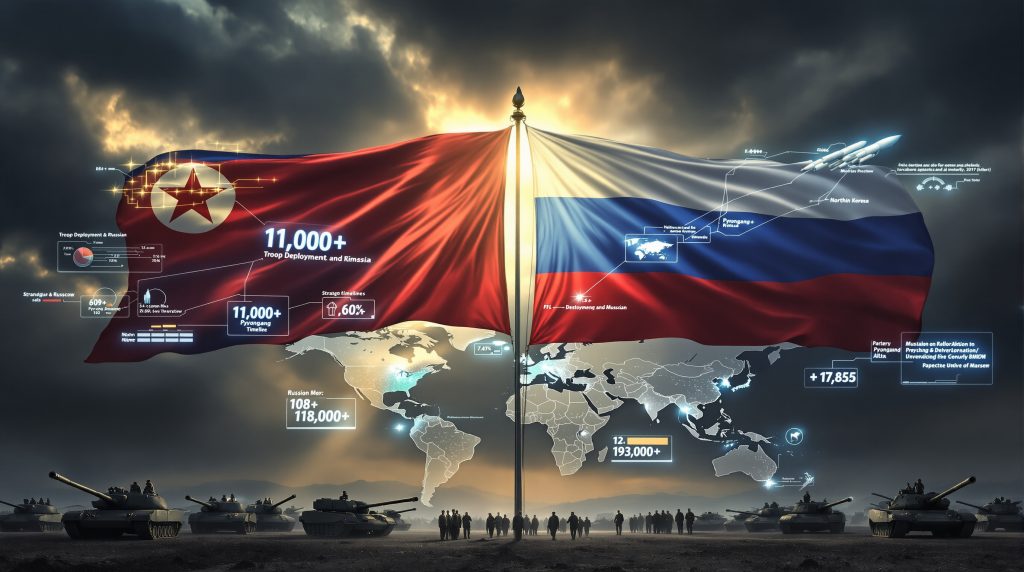What Is the Current State of North Korea-Russia Military Cooperation?
The strategic alliance between Pyongyang and Moscow has transformed from historical cooperation into an active military partnership that fundamentally reshapes global security dynamics. This evolving relationship demonstrates how isolated nations can leverage mutual support to enhance their strategic positions while challenging established international frameworks. Moreover, these developments have significant implications for energy security trends worldwide.
Partnership Components and Scale
Current Military Cooperation Overview
| Cooperation Type | Scale | Timeline | Strategic Impact |
|---|---|---|---|
| Personnel Deployment | 11,000+ troops | 2024-2025 | Direct combat operations |
| Weapons Supply | Artillery/missiles | Ongoing | Sustained conflict support |
| Technology Transfer | Advanced systems | Bilateral | Enhanced capabilities |
| Economic Integration | Energy/resources | Continuous | Sanctions circumvention |
The partnership encompasses multiple domains beyond traditional arms sales. North Korea military ties with Russia now include sophisticated technology sharing, personnel deployment, and comprehensive economic cooperation designed to strengthen both nations against international isolation.
Recent developments indicate this cooperation has reached unprecedented levels. Kim Jong Un has stated that military ties with Russia will advance non-stop, highlighting the commitment both nations have made to this strategic partnership.
Why Has This Alliance Become Strategically Critical for Both Nations?
The deepening military cooperation serves distinct strategic objectives while creating mutual dependencies that reinforce the partnership against mounting international pressure. Furthermore, tariffs impact markets in ways that make alternative partnerships increasingly valuable for both nations.
Russia's Strategic Requirements
Moscow's engagement with Pyongyang addresses several critical challenges:
- Personnel shortages requiring foreign military assistance for sustained operations
- Ammunition supply gaps necessitating external munitions sources
- International isolation creating need for alternative partnerships
- Economic pressures from comprehensive sanctions requiring creative solutions
Russia reportedly struggles to maintain recruitment levels amid mounting losses and reduced financial incentives. The country has indicated it may use reservists to defend civilian infrastructure, potentially freeing more troops for frontline operations where significant casualties continue.
North Korea's Strategic Benefits
Pyongyang gains substantial advantages through expanded military cooperation:
- Advanced military technology access previously unavailable through sanctions
- Economic lifeline during intensified international pressure
- Diplomatic leverage through association with major power status
- Security guarantees through mutual defense commitments
The partnership provides North Korea with sophisticated military capabilities while offering economic opportunities that help circumvent international sanctions effectively.
How Does Enhanced Military Cooperation Change Regional Security?
The comprehensive defense relationship between these nations represents the most significant bilateral security commitment in decades, creating ripple effects throughout regional security architecture. Consequently, these developments have created unprecedented challenges for international stability.
Military Assistance Provisions
The partnership includes immediate military support requirements similar to collective defense arrangements. This creates a de facto military alliance structure that extends beyond traditional bilateral cooperation into active combat support.
Technology and Capability Enhancement
Beyond conventional military aid, the relationship encompasses sophisticated technology sharing across multiple domains including:
- Satellite reconnaissance capabilities
- Advanced missile guidance systems
- Nuclear program technical assistance
- Air defense technology upgrades
Economic Integration Elements
The agreement includes comprehensive economic cooperation designed to circumvent international sanctions while strengthening bilateral trade relationships through alternative payment mechanisms.
What Military Assets and Personnel Are Being Exchanged?
The scope of military cooperation extends far beyond traditional arms sales to include active personnel deployment and advanced weapons systems transfer. Additionally, Putin has confirmed that ties with North Korea are developing as planned, indicating the strategic nature of this partnership.
Personnel and Weapons Contributions
North Korean Military Support:
- 11,000 troops deployed to assist Russian operations in 2024
- Additional reinforcements planned for early 2025
- Specialized units for specific operational requirements
- Artillery shells supplied in massive quantities
- Ballistic missile systems and specialized munitions
North Korea has become Russia's largest supplier of foreign troops, with personnel specifically deployed to help Moscow address Ukrainian forces in the Kursk region. The scale of this deployment represents unprecedented military cooperation between the nations.
Advanced Technology Transfers
Russia provides North Korea with sophisticated military capabilities including:
- Satellite technology for enhanced reconnaissance
- Nuclear program assistance for advanced capabilities
- Missile guidance systems for improved accuracy
- Air defense upgrades for enhanced protection
How Are International Powers Responding to This Alliance?
The strengthening North Korea military ties with Russia has prompted coordinated responses from Western nations and regional powers, fundamentally altering global security calculations. In addition, these developments mirror patterns observed in uranium market trends where geopolitical tensions affect strategic resource markets.
United States Response Strategy
Sanctions Escalation
The U.S. has implemented targeted sanctions on Russia's top oil producers while signaling potential penalties for third-party nations purchasing sanctioned outputs. These measures represent some of the toughest sanctions in months, directly targeting key revenue sources.
Coalition Building Efforts
Washington has strengthened coordination with European allies and Asian partners through initiatives like the Coalition of the Willing, involving more than 20 nations backing Ukraine with comprehensive support packages.
Military Posture Adjustments
Enhanced defense cooperation with South Korea and Japan reflects concerns about regional security implications, with increased military aid and strategic planning coordination.
European Union and United Kingdom Actions
Coordinated Sanctions Implementation
The EU has introduced its 19th sanctions package targeting Russian energy exports while specifically addressing North Korean military cooperation. The UK has implemented parallel measures creating comprehensive pressure.
Four-Step Strategy
European leaders have outlined specific steps to force negotiation: supporting Ukraine financially with frozen Russian reserves, imposing tougher sanctions, supplying long-range weapons, and delivering enhanced air defense systems.
What Are the Economic Dimensions of This Military Partnership?
The alliance extends beyond military cooperation to encompass significant economic relationships helping both nations circumvent international sanctions through sophisticated mechanisms. However, these developments occur alongside broader shifts such as the Russian uranium ban that reshape global commodity markets.
Energy and Resource Cooperation
Russian Energy Exports
Despite international sanctions, energy cooperation continues through alternative payment mechanisms and third-party arrangements. Hungary stands to lose from recent oil sanctions coming into effect in November 2025, highlighting the complexity of energy relationships.
Alternative Trading Systems
Both nations have developed sophisticated methods to conduct trade outside traditional international banking systems, using various countries and entities as intermediaries for transactions.
Market Impact Factors
Supply Chain Disruptions
Military cooperation affects global oil supply chains through sanctions on Russian producers and alternative supply arrangements, contributing to market volatility.
Price Dynamics
Russian oil exports account for approximately one-third of total federal budget revenues, making them crucial for funding military operations. Strikes on refineries combined with falling oil prices compound economic pressures.
How Does This Alliance Impact Global Energy Security?
The military partnership has significant implications for global energy markets and supply chain stability through multiple interconnected factors. Furthermore, the mineral production order in the United States demonstrates how nations are responding to supply chain vulnerabilities.
Oil Market Implications
Supply and Pricing Effects
Recent sanctions on Russia's top oil producers have created potential for significant market disruption. The measures signal that third parties buying sanctioned output, including major consumers like China and India, could face penalties.
Strategic Resource Access
Both nations possess significant mineral and energy resources that become more accessible through partnership arrangements, affecting global resource distribution and pricing dynamics.
Long-term Energy Security Concerns
The partnership demonstrates how geopolitical alliances can reshape energy markets outside traditional frameworks, creating alternative supply chains that challenge established global energy architectures.
What Are the Long-term Strategic Implications?
The evolving North Korea military ties with Russia represents a fundamental shift toward multipolar global security architecture with extensive consequences for international relations.
Multipolar World Development
Alternative Alliance Structures
The partnership demonstrates emergence of security arrangements outside traditional Western-led systems, potentially inspiring similar collaborations among other isolated or sanctioned nations.
Power Balance Shifts
Regional and global power dynamics are being reshaped through these alliance structures, creating new centres of influence that operate independently of established international institutions.
Technology and Innovation Acceleration
Military Capability Enhancement
Cooperation accelerates military technology development in both nations with potential global implications, particularly in nuclear, missile, and space technologies.
Cyber and Space Domains
Enhanced cooperation in cyber capabilities and space technology affects global security domains, potentially creating new challenges for international cybersecurity and space governance.
How Might This Alliance Evolve in 2025 and Beyond?
Several critical factors will determine the future trajectory of this military cooperation, with implications extending far beyond bilateral relations.
Potential Expansion Areas
Nuclear Cooperation Enhancement
Deeper nuclear technology sharing could significantly alter regional and global security calculations, potentially affecting non-proliferation frameworks and regional stability.
Space Programme Collaboration
Joint space initiatives may enhance both nations' strategic capabilities and international influence, creating new dynamics in space competition and cooperation.
Cyber Warfare Coordination
Increased cooperation in cyber domains could create new challenges for international cybersecurity, particularly given both nations' sophisticated cyber capabilities.
Constraining Factors
International Pressure Sustainability
Sustained international sanctions and diplomatic pressure may constrain alliance expansion, though both nations have demonstrated resilience in circumventing restrictions.
Economic Viability Concerns
Long-term economic sustainability depends on both nations' ability to manage sanctions pressure while maintaining technological and military cooperation benefits.
Regional Stability Calculations
Escalating tensions may prompt stronger international responses that limit cooperation scope, particularly if nuclear cooperation becomes more apparent.
Strategic Implications for Global Security Architecture
The deepening military cooperation between North Korea and Russia signals more than bilateral partnership enhancement. This alliance challenges traditional Western-led international systems while creating new dynamics affecting energy markets, regional security, and global stability frameworks.
Understanding these developments requires recognising both immediate tactical benefits each nation gains and broader strategic implications for international relations. As this partnership continues evolving, its impact on global security architecture, energy market dynamics, and international law will likely intensify, requiring adaptive responses from the international community.
The alliance demonstrates how isolated nations can leverage mutual cooperation to enhance strategic positions while challenging existing international frameworks. This trend toward alternative alliance structures may become increasingly significant in shaping contemporary geopolitical landscapes.
Disclaimer: This analysis is based on publicly available information and expert assessments current as of October 2025. Geopolitical situations evolve rapidly, and readers should verify current developments through reliable news sources. The strategic implications discussed represent analytical assessments rather than predictions of specific outcomes.
Looking for Investment Opportunities in Defence and Strategic Resource Sectors?
Discovery Alert's proprietary Discovery IQ model delivers real-time alerts on significant ASX mineral discoveries, including critical defence minerals and strategic resources that could benefit from shifting geopolitical dynamics. With enhanced military cooperation reshaping global supply chains, subscribers receive instant notifications on mining companies positioned to capitalise on emerging strategic resource demands, ensuring you identify actionable opportunities ahead of the broader market.




